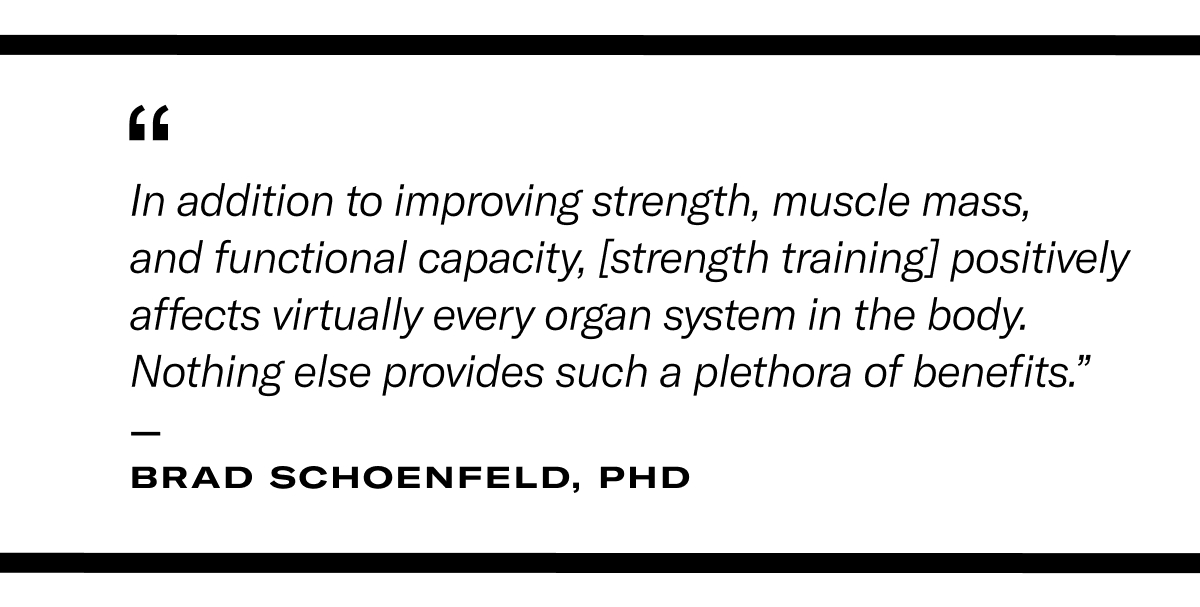The health benefits of strength training are clear: You can live a longer, more fulfilling life with just two to three workouts a week.

People are always on the hunt for ways to slow the aging process and live longer, healthier lives free from disease and injury. Strength training, experts say, is that fountain of youth.
“While all forms of exercise can be beneficial, resistance training is arguably the most important activity you can do for overall health and wellness,” says hypertrophy expert and Tonal Advisory Board member, Brad Schoenfeld, PhD. “In addition to improving strength, muscle mass, and functional capacity, it positively affects virtually every organ system in the body. Nothing else provides such a plethora of benefits.”
Even better news: Current research backs this up. Here are four science-supported benefits of strength training that will inspire you to add a few lifting sessions to your regular routine.
1. Add Years to Your Life (and Enjoy Them More)
Strength training can help you live longer, regardless of your age or other factors impacting your health. Muscle strength is an independent and strong predictor of all-cause mortality, meaning despite what other conditions you might have, higher overall strength may lead to a longer life, explains Hamilton Roschel, PhD, Head of the Applied Physiology and Nutrition Research Group at University of São Paulo. In fact, a meta-analysis of over two million healthy adults published in the Archives of Physical Medicine and Rehabilitation showed higher levels of strength can be linked to a 14-percent lower risk of all causes of death.
That connection between strength and longevity comes down to how much you move. A review published in the Journal of American College of Cardiology found that physical inactivity may increase your risk of premature death associated with chronic disease by 20 to 30 percent. And low levels of strength mean you’re probably not moving enough on a daily basis or your activity is limited, explains Roschel.
Maintaining strength with regular exercise, though, will help you enjoy those extra years even more. Life is easier when it is easy to move–think about how many times you sit and stand, walk to different places, and climb stairs in a day. A large review published in Cochrane Library showed strength training improves overall function and your ability to perform everyday activities like carrying groceries into the house.
“At some point in your life, critical activities of daily living are going to depend on how strong you are,” says Stuart Phillips, PhD, Professor of Kinesiology and muscle physiology expert. Plan now to invest in developing strength to buffer yourself against the effects of aging.”

2. Slow the Effects of Aging
Speaking of aging, that process manifests in physical and mental changes over time. Research shows muscle mass can decline by 10 percent every decade past 30, and some studies suggest that cognitive function also slides with age.
You can hit the brakes, however, on these changes by starting to strength train as early as possible so you have a higher set point when muscle mass declines as you age, explains Louisa Nicola, neurophysiologist and Tonal Advisory Board member. Incorporating full-body strength workouts into your routine at least two days per week can not only maintain muscle mass, strength, and power, but it can also play a role in preserving cognitive function and memory, so you can think clearer, longer.
Plus, it’s never too late to start. The American College of Sports Medicine suggests that older adults, 65 years or older, can increase their strength anywhere from 25 to over 100 percent after participating in regular strength training.
3. Better Manage Your Weight and Body Composition
The number on the scale isn’t the most important factor of your health, but you can manage your weight and lose fat when you include strength training in your routine. In a six-year study, over 11,000 participants who practiced strength training saw a 30-percent reduced risk of obesity, suggesting that strength training is essential in your program if you’re trying to maintain your weight.
Strength training is also crucial when you’re looking to lose fat. Otherwise, you’ll actually end up losing muscle mass, which isn’t advantageous for aesthetics, function, or health, explains Schoenfeld. An even bigger bonus: A recent meta-analysis showed building up muscle mass helps reduce visceral fat—the body fat that sits around your middle—which is linked to chronic diseases such as cardiovascular disease, type 2 diabetes, and metabolic conditions.

4. Decrease Your Risk of Injury
By building up the muscles and tendons around the joints, research also shows you’ll have more protection from minor and major injuries. Take falls, for example. Falls are one of the most common injuries in older adults, and falls (or even the fear of falling) can influence long-term independence.
Strength training improves your balance, flexibility, and coordination, and can reduce the risk of taking a tumble. Even if you do take a spill, you’re less likely to break a bone if you’re lifting. “The multi-directional stress of resistance training helps maintain and build bone strength, preventing osteoporosis,” says Stacy Sims, PhD, female physiology expert and Tonal Advisory Board member. It’s also effective in relieving the nagging symptoms of osteoarthritis (think: stiffness and soreness), according to a review article published in Rehabilitation.
The bottom line: Strength training can help you live longer, maintain a healthy weight, provide protection from injury, and ultimately increase your overall well-being and vitality. Plus, it’s never too late to start. Just two to three workouts a week is an expert-backed, research-supported way to boost the health of every athlete at any age. Tonal has guided strength training programs for people at all levels, from beginners to advanced lifters, making it easy for anyone to experience the benefits of strength training right from home.


